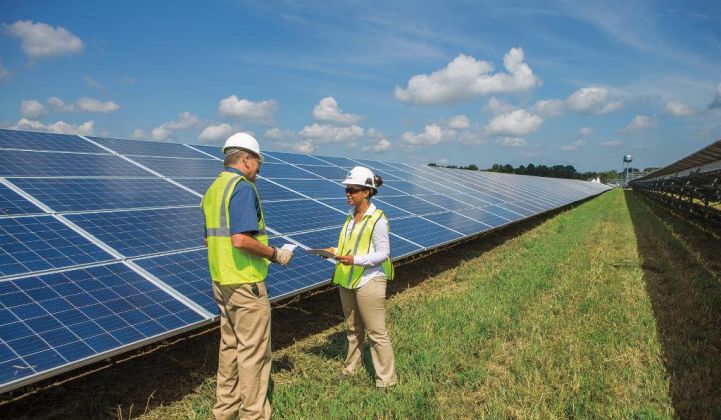Virginia regulators have rejected a proposal from Dominion Energy to offer 100 percent renewable energy plans to large electricity customers in the state.
The decision was praised by clean energy groups and retail suppliers that argued that approving the utility program would effectively eliminate third-party competition. Under current Virginia law, third-party companies can sell 100 percent renewable power directly to customers, unless the customer’s incumbent utility offers a separate 100 percent renewable tariff, like the one Dominion put forward.
In a final order released Monday, the Virginia State Corporation Commission (SCC) determined that Dominion "has not established that its proposed tariffs will result in just and reasonable rates" and that "there is simply too much uncertainty and subjectivity in the tariffs for the Commission to find that they will result in just and reasonable rates."
Dominion sought approval for six renewable energy tariffs, whereby existing or new non-residential customers with peak demands of 1,000 kilowatts or greater could choose to purchase 100 percent of their energy needs from a portfolio of renewable energy resources, dubbed the CRG Portfolio, developed exclusively for them.
Dominion specifically planned to solicit the wholesale renewable energy market within the PJM Interconnection footprint and negotiate and execute power purchase agreements for new or existing facilities, and to develop new utility-owned renewable energy resources to serve the needs of CRG Rate Schedule customers.
While the proposal appeared to offer more clean energy choices to commercial customers, renewable energy advocates pushed back against Dominion's filing, questioning the monopoly utility's motives.
“Does Dominion’s filing seek to substantively advance renewable generation in Virginia, or is it really only designed to cut off competition without achieving any measurable increase in renewable generation?” Will Cleveland at the Southern Environmental Law Center asked last year. “Can a utility just come in and get some really bad tariff approved that nobody actually signs up for, but [which] still blocks third-party competition?”
Peter Anderson, Virginia program manager at Appalachian Voices, said the SCC's decision to reject the proposal this week is "a victory" for Virginia businesses and the state as a whole.
"The more options customers have when purchasing clean energy, the better — whether that means self-generation, community solar projects, or, as is the case here, the right to purchase 100 percent renewable energy from several different companies,” he said. “Competition in clean energy helps keep prices reasonable and empowers customers to choose what’s right for them.”
The decision is a win for retail electricity supplier Direct Energy, which won the right last year to sell 100 percent renewable energy to large electricity customers in Virginia — if the state's investor-owned utilities did not have a similar offering. That victory could be short-lived.
Monday's order rejects Dominion's tariff proposal, but does not prevent the utility from seeking approval again with a different program design. The utility is already exploring its options to resubmit.
"We are continuing to push forward on finding ways to meet the needs of customers looking for 100 percent renewable energy options," Dominion spokesperson Le-Ha Anderson, wrote in an email. "We are already reviewing the issues raised by the State Corporation Commission in order to develop a plan to address those concerns and expand our offerings to meet our customers’ needs."
Dominion has also proposed a separate “green tariff” that targets residential customers, which is currently pending a hearing before the SCC. Virginia regulators rejected a similar filing from Appalachian Power last year, stating the utility failed to prove the proposal is in the public interest.
While Dominion is looking to develop new renewable energy resources in Virginia, the utility's latest integrated resource plan calls for building eight new gas-fired power plants by 2033.
Paul Koonce, CEO of Dominion Energy Power Generation Group, said in a statement that the utility remains committed to "a diverse, balanced generation fleet that avoids over-reliance on a single fuel type or technology."
--
Grid Edge Innovation Summit is the leading future energy conference that will examine the energy customer of tomorrow and how new innovative business models are quickly emerging. Join us as we bring together the most forward thinking and prominent members of the energy ecosystem and as our research team explores the future of the market.




